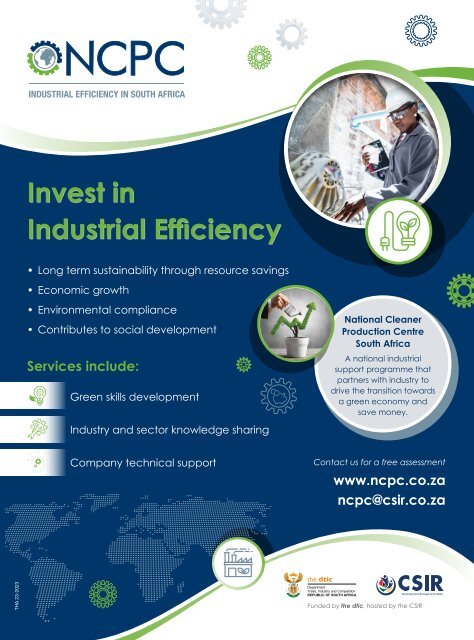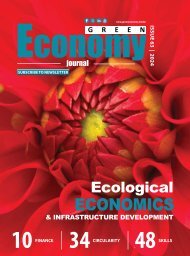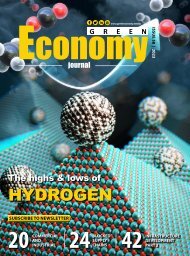Green Economy Journal Issue 61
You also want an ePaper? Increase the reach of your titles
YUMPU automatically turns print PDFs into web optimized ePapers that Google loves.
RESOURCE EFFICIENCY<br />
Invest in<br />
Industrial Efficiency<br />
• Long term sustainability through resource savings<br />
Assisting South African<br />
• Economic growth<br />
• Environmental compliance<br />
• Contributes to social development<br />
National Cleaner<br />
Production Centre<br />
South Africa<br />
CHEESE AND DAIRY PLANTS<br />
transition to better water and energy efficiency practices<br />
THA 23-2023<br />
Services include:<br />
<strong>Green</strong> skills development<br />
Industry and sector knowledge sharing<br />
Company technical support<br />
A national industrial<br />
support programme that<br />
partners with industry to<br />
drive the transition towards<br />
a green economy and<br />
save money.<br />
Contact us for a free assessment<br />
www.ncpc.co.za<br />
ncpc@csir.co.za<br />
Funded by the dtic, hosted by the CSIR<br />
The recently released report, Resource Efficiency for the<br />
Cheese and Yoghurt Dairy Sector in South Africa, provides<br />
insights and recommendations for companies engaged in<br />
agricultural processing transition to better water and energy<br />
efficiency practices.<br />
The South African cheese and yoghurt dairy sector is a major water<br />
user, utilising an estimated 8.7-million kilolitres of water each year.<br />
The report identifies several energy and water opportunities for<br />
cheese and dairy plants and outlines practical measures to improve<br />
resource efficiency.<br />
The report was developed as part of a resource efficiency<br />
benchmarking study for the South African cheese and yoghurt<br />
dairy sector that was conducted by the International Federation<br />
Corporation (IFC), in partnership with the National Cleaner Production<br />
Centre South Africa (NCPC-SA) and the Swiss State Secretariat for<br />
Economic Affairs (SECO).<br />
“The South African dairy sector has an opportunity through the<br />
adoption of both efficiency and sustainable technologies to significantly<br />
reduce its environmental impact, specifically pertaining to resource<br />
utilisation and carbon footprint,” explains Lindani Ncwane, NCPC-SA<br />
senior project manager.<br />
The study benchmarked the water and energy usage of six dairies<br />
across the country against local and international best practices. Two<br />
large dairies were from the Eastern Cape and have a variety of products<br />
including cheese, an additional two medium-sized cheese factories<br />
were also from the same region. The final two, one medium-sized<br />
with a variety of products including yoghurt and milk, and the other,<br />
a small cheese factory, were from the Western Cape.<br />
The report provides the cheese and yoghurt dairy industry with<br />
practical examples that can be implemented to address water losses,<br />
educate employees on water management, and ultimately, save<br />
plants money.<br />
“A dairy plant could reduce its water consumption by over 40% by<br />
implementing a number of water efficiencies measures and a further<br />
20% by implementing recycling and re-use measures,” reiterates<br />
Ncwane. The potential savings if South African cheese and yoghurt<br />
dairy plants would implement resource efficiency practices across<br />
the board amount to:<br />
• Water consumption could be reduced by up to 69%, resulting in<br />
savings of six-million kilolitres nationally per annum with savings<br />
of around R138-million and R200-million annually.<br />
• Electrical energy consumption could be reduced by 25% to 50%,<br />
resulting in savings of 200 000MWh to 400 000MWh per annum with<br />
a cost saving of around R250-million to R500-million per annum.<br />
• Fuel consumption could be reduced by up to 30% and a 50% reduction<br />
in GHG emissions of fossil fuels (assuming a 50% uptake in a switch<br />
in fuels) which would result in a R180-million saving per annum.<br />
Ncwane encourages the South African cheese and yoghurt dairy<br />
industry to download copies of the report so, “They will learn and be<br />
able to identify opportunity areas for savings within their factories.”<br />
Report copies can be downloaded from the NCPC-SA website<br />
(www.ncpc.co.za).<br />
The NCPC-SA is a national industry support programme managed<br />
by the Council for Scientific and Industrial Research (CSIR) on behalf of<br />
the Department of Trade, Industry and Competition (the dtic). The<br />
NCPC-SA’s mandate is to support the transition of South African industrial<br />
and selected commercial sectors to a low-carbon, green economy.<br />
27

















